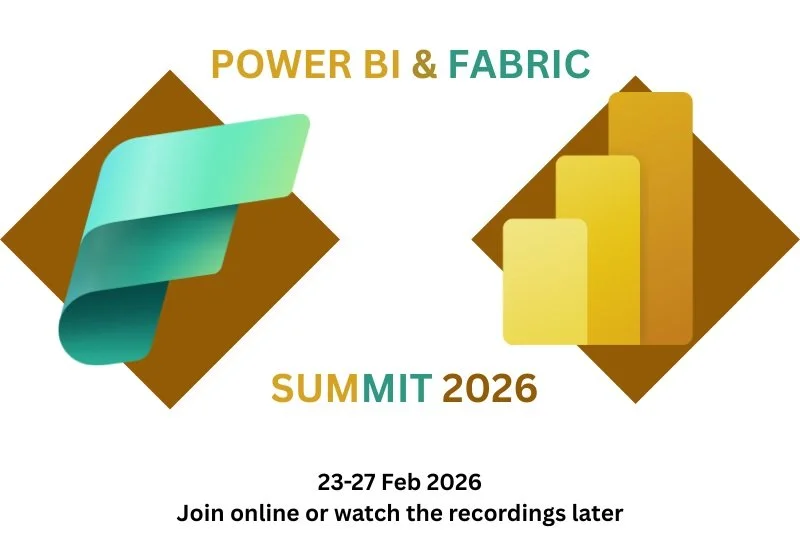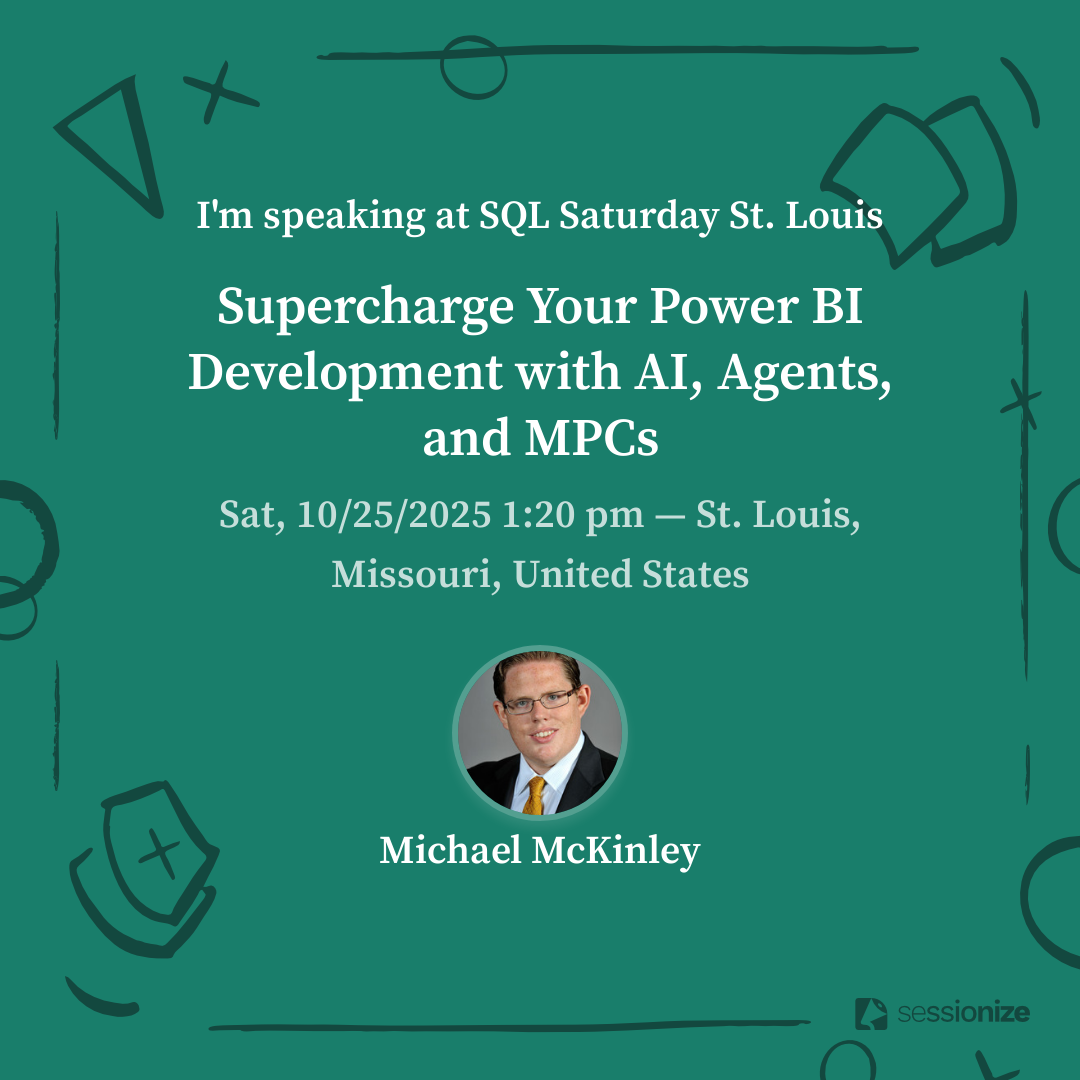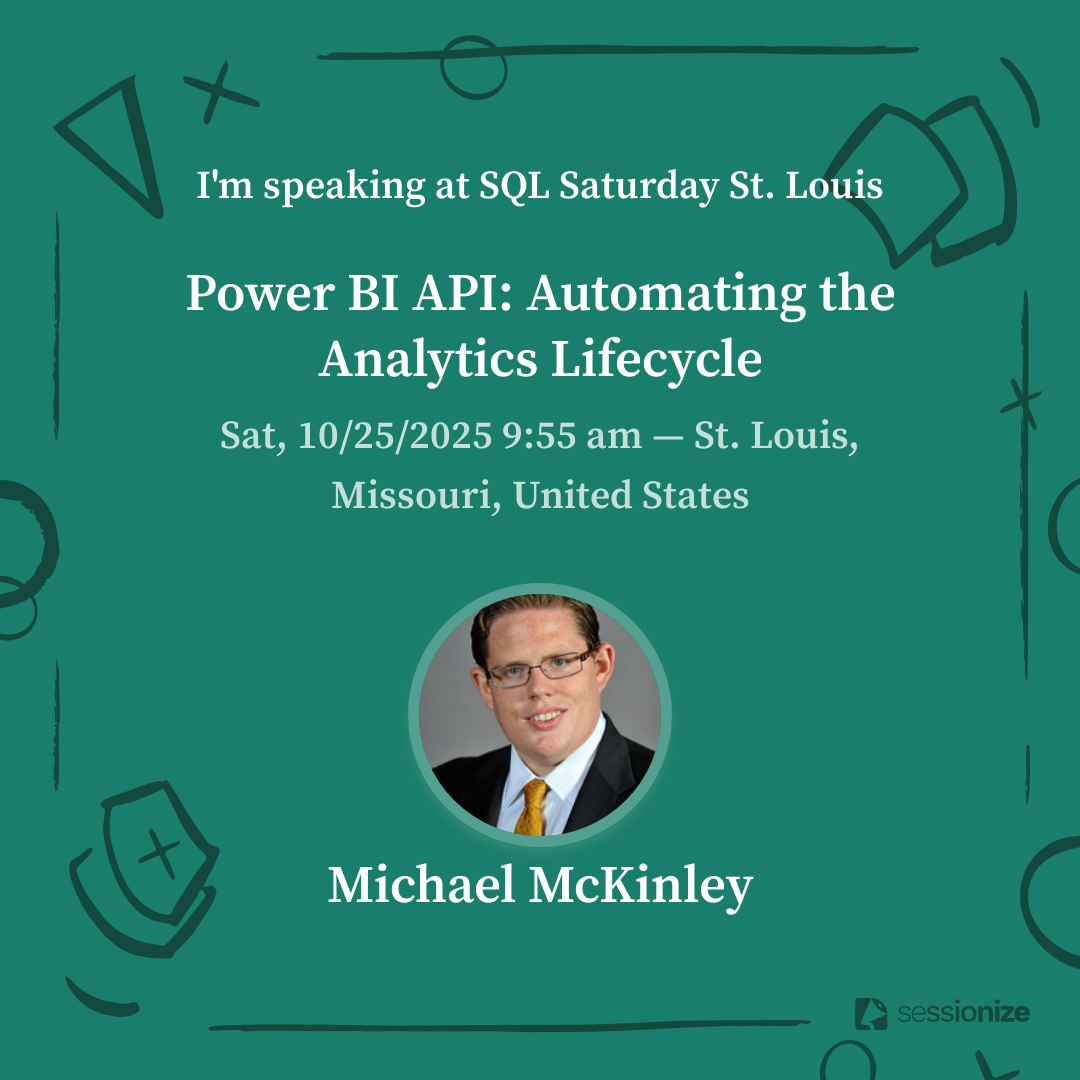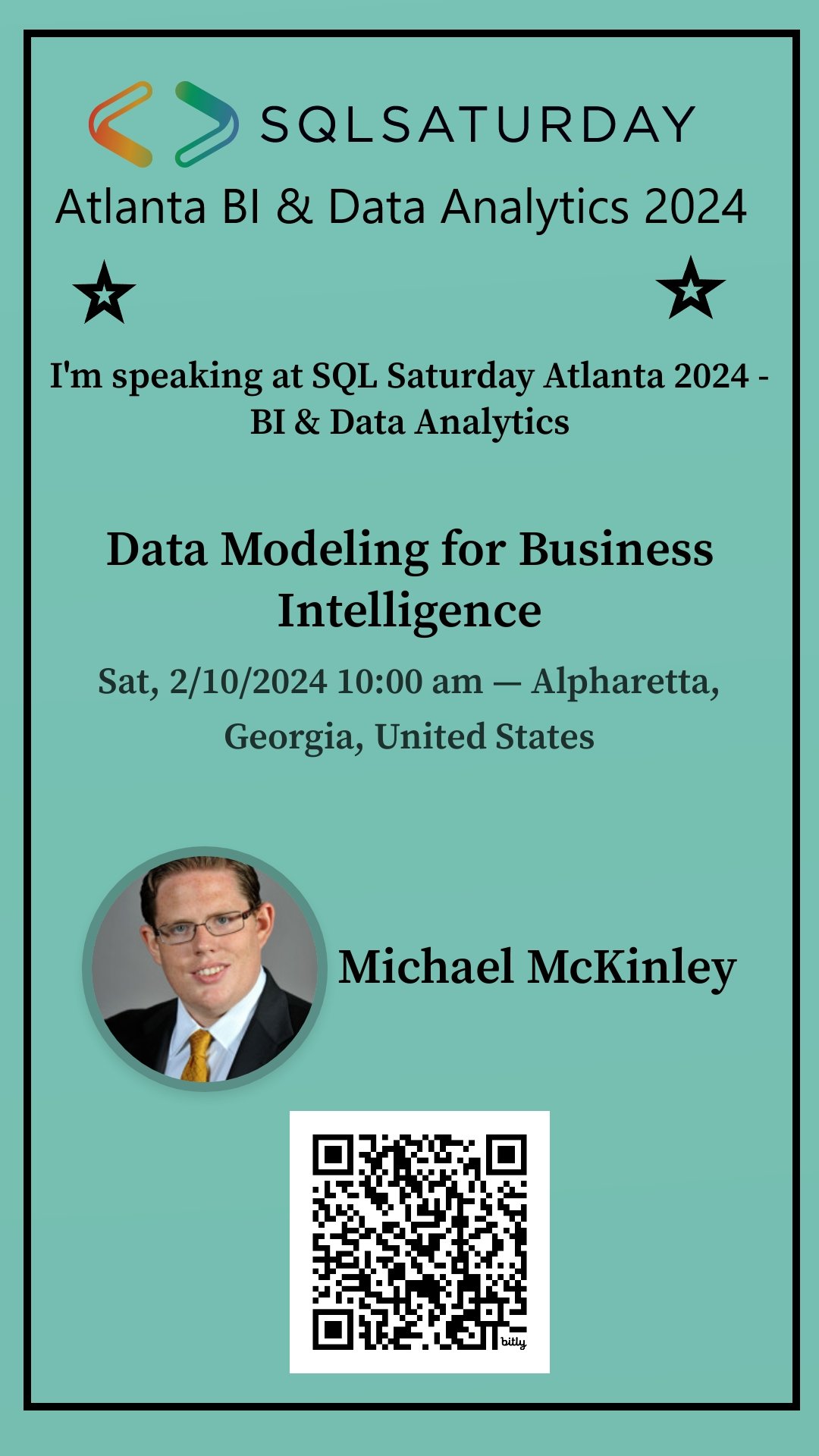Speaking Events
Application Lifecycle Management for Business Intelligence: ALM for BI
Managing Power BI development in a team setting can be challenging—avoiding code conflicts, ensuring seamless collaboration, and deploying updates effectively require a strategic approach. In this session, I’ll share how principles from application development can be applied to Power BI, introducing state-of-the-art practices for managing the BI development lifecycle.
You’ll learn how to:
• Enable multiple developers to work on the same dataset simultaneously.
• Store your Power BI models as code in your source repository.
• Use Git for version control, change tracking, and collaboration.
• Integrate with ticketing systems and implement deployment pipelines for continuous integration and delivery.
Whether you manage a team of BI developers or work on one, this session will equip you with tools and strategies to tackle some of the most pressing challenges in BI development and scale your Power BI projects effectively.
Application Lifecycle Management for Business Intelligence: ALM for BI
Managing Power BI development in a team setting can be challenging—avoiding code conflicts, ensuring seamless collaboration, and deploying updates effectively require a strategic approach. In this session, I’ll share how principles from application development can be applied to Power BI, introducing state-of-the-art practices for managing the BI development lifecycle.
You’ll learn how to:
• Enable multiple developers to work on the same dataset simultaneously.
• Store your Power BI models as code in your source repository.
• Use Git for version control, change tracking, and collaboration.
• Integrate with ticketing systems and implement deployment pipelines for continuous integration and delivery.
Whether you manage a team of BI developers or work on one, this session will equip you with tools and strategies to tackle some of the most pressing challenges in BI development and scale your Power BI projects effectively.
Supercharge Your Power BI Development with AI, Agents, and MCPs
Unlock the next level of Power BI development with the latest AI tools—ChatGPT, Copilot, MCPs, and beyond. This session explores how AI is reshaping every stage of the Power BI lifecycle, from design to delivery, and introduces cutting-edge advancements like model context protocols (MPCs) and autonomous AI agents.
Learn how AI now empowers Power BI developers to:
• Accelerate DAX creation and troubleshooting with context-aware suggestions tailored to complex calculations.
• Demystify data modeling challenges, including filter context, relationships, and performance bottlenecks, through AI-guided recommendations.
• Design impactful visuals and data stories, leveraging AI to generate layouts, narratives, and presentation-ready insights aligned to your audience.
• Streamline repetitive workflows with AI agents that can build reports, publish to the Power BI Service, optimize models, and summarize insights autonomously.
• Orchestrate end-to-end development with MPCs, chaining together AI tasks across multiple tools and modalities to deliver smarter, faster BI solutions.
• Enhance governance and documentation, with AI automating report descriptions, data lineage mapping, and compliance-ready outputs.
Whether you’re new to Power BI or a seasoned expert, discover how AI is transforming BI development from reactive problem-solving to proactive, intelligent automation—helping you work smarter, deliver faster, and drive real business impact.
Power BI API: Automating the Analytics Lifecycle
Take your Power BI solutions beyond the Desktop! In this session, we’ll dive into advanced use cases for the Power BI REST API, showcasing how to automate your workflow, streamline your development, and integrate into your custom portals. Learn how to automate report deployment, create personalized experiences with row-level security, and leverage real-time data updates to keep your visuals fresh.
Whether you’re building internal tools or client-facing applications, this session will provide actionable insights and practical examples to help you unlock the full potential of the Power BI API. Join us to supercharge your analytics solutions!
Application Lifecycle Management for Business Intelligence: ALM for BI
Managing Power BI development in a team setting can be challenging—avoiding code conflicts, ensuring seamless collaboration, and deploying updates effectively require a strategic approach. In this session, I’ll share how principles from application development can be applied to Power BI, introducing state-of-the-art practices for managing the BI development lifecycle.
You’ll learn how to:
• Enable multiple developers to work on the same dataset simultaneously.
• Store your Power BI models as code in your source repository.
• Use Git for version control, change tracking, and collaboration.
• Integrate with ticketing systems and implement deployment pipelines for continuous integration and delivery.
Whether you manage a team of BI developers or work on one, this session will equip you with tools and strategies to tackle some of the most pressing challenges in BI development and scale your Power BI projects effectively.
Application Lifecycle Management for Business Intelligence: ALM for BI
Managing Power BI development in a team setting can be challenging—avoiding code conflicts, ensuring seamless collaboration, and deploying updates effectively require a strategic approach. In this session, I’ll share how principles from application development can be applied to Power BI, introducing the state-of-the-art practices for managing the BI development lifecycle. You’ll learn how to:
• Enable multiple developers to work on the same dataset simultaneously.
• Store your Power BI models as code in your source repository.
• Use Git for version control, change tracking, and collaboration.
• Integrate with ticketing systems and implement deployment pipelines for continuous integration and delivery.
Whether you manage a team of BI developers or work on one, this session will equip you with tools and strategies to tackle some of the most pressing challenges in BI development and scale your Power BI projects effectively.
AI in Action: Supercharging Power BI Development and Troubleshooting
Unlock the power of AI to streamline your Power BI workflows, from design to delivery. This session explores how tools like ChatGPT, Copilot, and other AI assistants can support every stage of Power BI development: designing reports, optimizing data models, troubleshooting issues, and even analyzing insights. Discover how AI tools like ChatGPT, Copilot, and others can:
• Simplify DAX creation and debugging, offering tailored solutions for complex calculations.
• Clarify data modeling challenges, including filter context and relationship issues, to deliver accurate insights.
• Provide actionable guidance for creating effective visuals that meet specific user needs.
• Summarize complex reports and datasets, empowering data consumers to generate insights independently.
• Streamline workflows for expert developers, reducing repetitive tasks and accelerating project delivery.
This session is designed to demonstrate how AI can elevate Power BI development at all skill levels, helping you work smarter and faster while delivering impactful results.
Power BI API: Automating the Analytics Lifecycle
Take your Power BI solutions beyond the Desktop! In this session, we’ll dive into advanced use cases for the Power BI REST API, showcasing how to automate your workflow, streamline your development, and integrate into your custom portals. Learn how to automate report deployment, create personalized experiences with row-level security, and leverage real-time data updates to keep your visuals fresh.
Whether you’re building internal tools or client-facing applications, this session will provide actionable insights and practical examples to help you unlock the full potential of the Power BI API. Join us to supercharge your analytics solutions!
AI in Action: Supercharging Power BI Development and Troubleshooting
Unlock the power of AI to streamline your Power BI workflows, from design to delivery. This session explores how tools like ChatGPT, Copilot, and other AI assistants can support every stage of Power BI development: designing reports, optimizing data models, troubleshooting issues, and even analyzing insights.
Discover how AI tools like ChatGPT, Copilot, and others can:
• Simplify DAX creation and debugging, offering tailored solutions for complex calculations.
• Clarify data modeling challenges, including filter context and relationship issues, to deliver accurate insights.
• Provide actionable guidance for creating effective visuals that meet specific user needs.
• Summarize complex reports and datasets, empowering data consumers to generate insights independently.
• Streamline workflows for expert developers, reducing repetitive tasks and accelerating project delivery.
This session is designed to demonstrate how AI can elevate Power BI development at all skill levels, helping you work smarter and faster while delivering impactful results.
Power BI API: Automating the Analytics Lifecycle
Take your Power BI solutions beyond the Desktop! In this session, we’ll dive into advanced use cases for the Power BI REST API, showcasing how to automate your workflow, streamline your development, and integrate into your custom portals. Learn how to automate report deployment, create personalized experiences with row-level security, and leverage real-time data updates to keep your visuals fresh.
Whether you’re building internal tools or client-facing applications, this session will provide actionable insights and practical examples to help you unlock the full potential of the Power BI API. Join us to supercharge your analytics solutions!
Power BI API: Automating the Analytics Lifecycle
Take your Power BI solutions beyond the Desktop! In this session, we’ll dive into advanced use cases for the Power BI REST API, showcasing how to automate your workflow, streamline your development, and integrate into your custom portals. Learn how to automate report deployment, create personalized experiences with row-level security, and leverage real-time data updates to keep your visuals fresh.
Whether you’re building internal tools or client-facing applications, this session will provide actionable insights and practical examples to help you unlock the full potential of the Power BI API. Join us to supercharge your analytics solutions!
AI in Action: Supercharging Power BI Development and Troubleshooting
Unlock the power of AI to streamline your Power BI workflows, from design to delivery. This session explores how tools like ChatGPT, Copilot, and other AI assistants can support every stage of Power BI development: designing reports, optimizing data models, troubleshooting issues, and even analyzing insights.
Discover how AI tools like ChatGPT, Copilot, and others can:
• Simplify DAX creation and debugging, offering tailored solutions for complex calculations.
• Clarify data modeling challenges, including filter context and relationship issues, to deliver accurate insights.
• Provide actionable guidance for creating effective visuals that meet specific user needs.
• Summarize complex reports and datasets, empowering data consumers to generate insights independently.
• Streamline workflows for expert developers, reducing repetitive tasks and accelerating project delivery.
This session is designed to demonstrate how AI can elevate Power BI development at all skill levels, helping you work smarter and faster while delivering impactful results.
Community Summit North America 2024: CI/CD in BI: How To Have Auditability in Your Power BI Reporting
If you have been developing Power BI reports in a team setting for any length of time, you have wondered how to manage that process and avoiding code conflicts.
In this session, I will borrow from my experience in application development and share with you the state of the art in solving this problem. You can have multiple developers working on the same dataset at the same time, and you can have your model exist as code in your source repository.
Automatic versioning and code diffs will tell you who made what changes when, and you can connect this work to a ticketing system if you would like. You can even set up deployment pipelines for continuous integration / continuous development.
If you manage a team of BI developers, or if you work on such a team, then this session will help you solve several of your biggest challenges.
Memphis Microsoft Community Days: Data Modeling for Business Intelligence
We all start using business intelligence tools by using a single dataset, like a flat file. Then, we hit a plateau in our learning curve, or we add a second flat file into our BI product, and we get incorrect results. One reason is that we haven’t modeled our solution correctly.
In order to move to the next level of our journey along the BI learning curve, we need to understand how a tool like Power BI works. Only then will we understand why we design our data models the way we do.
In this session, we will review how tools like Power BI work under the covers and how that impacts the way we construct our data models. This is an introductory level course, so we will not get too technical, just enough to get us to the next level and moving back up that learning curve!
Nashville Power BI User Group March 2024 Meetup: Requirements Gathering 101
No analytics, BI, or reporting effort will succeed without a great foundation. If you, the report creator, do not know what success looks like in the eyes of your stakeholders and report consumers, your reporting project is destined to fail.
In this presentation, we will begin with the basics, understanding the "why" behind the report(s) you are creating, and then explore a method I call "design backward and build forward".
Together, we will explore the process and technique of what sets a great foundation for successful analytics. Join us on March 21 to discuss how to build a great foundation for your next reporting project.
Data Modeling for Business Intelligence
We all start using business intelligence tools by using a single dataset, like a flat file. Then, we hit a plateau in our learning curve, or we add a second flat file into our BI product, and we get incorrect results. One reason is that we haven’t modeled our solution correctly.
In order to move to the next level of our journey along the BI learning curve, we need to understand how a tool like Power BI works. Only then will we understand why we design our data models the way we do.
In this session, we will review how tools like Power BI work under the covers and how that impacts the way we construct our data models. This is an introductory level course, so we will not get too technical, just enough to get us to the next level and moving back up that learning curve!
Nashville Power BI User Group January 2024 Meetup: Intro to Microsoft Fabric
Microsoft Fabric is an all-in-one SaaS analytics solution combining elements from Power BI, Azure Synapse, and Azure Data Factory. In a unified platform, this combination allows users to build:
Scalable data pipelines with native connections to ~200 data sources
Machine Learning models
Data Warehouses
Data Lakehouses
Real-time analytics solutions
Power BI report and dashboards
During this talk, we'll introduce Fabric's features and capabilities. We'll also demo how to build a data pipeline, load data into Fabric's OneLake, model the data, and visualize the data with Power BI.
SQL Saturday Atlanta 2023 BI: Power BI & ALM: Or How to Do Version Control at Scale
If you have ever developed Power BI content with someone else or within a team, you know how difficult it can be to manage version control. Also, what if you need traceability and audit capability? This can be a crucial requirement for Sarbanes-Oxley compliance.
That said, not every team and not every Power BI solution requires the same level of rigor. In this meetup, we will explore the options for managing version conflict and being able to trace the changes you make to your Power BI content.
SQL Saturday Minnesota 2022: Data Modeling for Business Intelligence
We all start using business intelligence tools by using a single dataset, like a flat file. Then, we hit a plateau in our learning curve, or we add a second flat file into our BI product, and we get incorrect results. One reason is that we haven’t modeled our solution correctly.
In order to move to the next level of our journey along the BI learning curve, we need to understand how a tool like Power BI works. Only then will we understand why we design our data models the way we do.
In this session, we will review how tools like Power BI work under the covers and how that impacts the way we construct our data models. This is an introductory level course, so we will not get too technical, just enough to get us to the next level and moving back up that learning curve!
SQL Saturday Orlando 2022: Data Modeling for Business Intelligence
We all start using business intelligence tools by using a single dataset, like a flat file. Then, we hit a plateau in our learning curve, or we add a second flat file into our BI product, and we get incorrect results. One reason is that we haven’t modeled our solution correctly.
In order to move to the next level of our journey along the BI learning curve, we need to understand how a tool like Power BI works. Only then will we understand why we design our data models the way we do.
In this session, we will review how tools like Power BI work under the covers and how that impacts the way we construct our data models. This is an introductory level course, so we will not get too technical, just enough to get us to the next level and moving back up that learning curve!
Power BI & ALM: Or How to Do Version Control at Scale
If you have ever developed Power BI content with someone else or within a team, you know how difficult it can be to manage version control. Also, what if you need traceability and audit capability? This can be a crucial requirement for Sarbanes-Oxley compliance.
That said, not every team and not every Power BI solution requires the same level of rigor. In this meetup, we will explore the options for managing version conflict and being able to trace the changes you make to your Power BI content.
The Nashville Analytics Summit 2021 — Basic Data Modeling for BI Reporting — Virtual and In-Person
We all start using business intelligence tools by using a single dataset, like a flat file. Then, we hit a plateau in our learning curve, or we add a second flat file into our BI product, and we get incorrect results. One reason is that we haven't modeled our solution correctly.
In order to move to the next level of our journey along the BI learning curve, we need to understand how a tool like Power BI works. Only then will we understand why we design our data models the way we do.
In this session, we will review how tools like Power BI work under the covers and how that impacts the way we construct our data models. This is an introductory level course, so we will not get too technical, just enough to get us to the next level and moving back up that learning curve!
The Nashville Modern Excel & Power BI User Group — Basic Data Modeling for BI Reporting — Virtual
In our BI journey, we all hit a plateau in our learning curve. One reason is that we haven't modeled our solution correctly. In order to move to the next level of our journey along the BI learning curve, we need to understand how a tool like Power BI works. Only then will we understand why we design our data models the way we do. In this session, we will review how tools like Power BI work how that impacts the way we build data models.
About: Michael McKinley is the founder of McKinley Consulting. Michael has managed data transformation projects for the last nine years. He is Microsoft Certified in Power BI and the Power Platform and has worked with major clients such as HCA, FedEx, and the United Methodist Church, among others.
SQL Saturday Atlanta BI 2020 — Basic Data Modeling for BI Reporting — Virtual
We all start using business intelligence tools by using a single dataset, like a flat file. Then, we hit a plateau in our learning curve, or we add a second flat file into our BI product, and we get incorrect results. One reason is that we haven't modeled our solution correctly.
In order to move to the next level of our journey along the BI learning curve, we need to understand how a tool like Power BI works. Only then will we understand why we design our data models the way we do.
In this session, we will review how tools like Power BI work under the covers and how that impacts the way we construct our data models. This is an introductory level course, so we will not get too technical, just enough to get us to the next level and moving back up that learning curve!
SQL Saturday Oregon 2020 — Basic Data Modeling for BI Reporting — Virtual
We all start using business intelligence tools by using a single dataset, like a flat file. Then, we hit a plateau in our learning curve, or we add a second flat file into our BI product, and we get incorrect results. One reason is that we haven't modeled our solution correctly.
In order to move to the next level of our journey along the BI learning curve, we need to understand how a tool like Power BI works. Only then will we understand why we design our data models the way we do.
In this session, we will review how tools like Power BI work under the covers and how that impacts the way we construct our data models. This is an introductory level course, so we will not get too technical, just enough to get us to the next level and moving back up that learning curve!
SQL Saturday El Salvador 2020 — Basic Data Modeling for BI Reporting — virtual
The tool that underpins Power BI and PowerPivot in Excel (and SSAS and AAS Tabular, for that matter) is the Vertipaq Engine. How it works and how we design our data models are intrinsic to one another; you cannot understand one without considering the other.
This will be an introductory session on the highest-level workings of the Vertipaq engine and how that knowledge informs the way we data model.
Also, check out the presentation for a more thorough accounting of data modeling, both transactional and dimensional data modeling.
SQL Saturday Salt Lake City 2020 — Basic Data Modeling for BI Reporting — virtual
Come learn about the basics of data modeling for your business intelligence and reporting needs. This course will cover several introductory modeling subjects, including:
Transactional vs. Analytical models
Kimball / Inman approaches
The process for designing your data model
Hierarchies / Parent-child relationships
SQL Saturday Chattanooga 2020 — Basic Data Modeling for BI Reporting — virtual
Come learn about the basics of data modeling for your business intelligence and reporting needs. This course will cover several introductory modeling subjects, including:
Transactional vs. Analytical models
Kimball / Inman approaches
The process for designing your data model
Hierarchies / Parent-child relationships
SQL Saturday Boston, BI Edition, 2020 — Basics Data Modeling for BI Reporting — Boston, MA, March 28, 2020
Come learn about the basics of data modeling for your business intelligence and reporting needs. This course will cover several introductory modeling subjects, including:
Transactional vs. Analytical models
Kimball / Inman approaches
The process for designing your data model
Hierarchies / Parent-child relationships
SQL Saturday Austin, BI Edition, 2020 — Basics of Data Modeling for BI Reporting — Austin, TX, February 8, 2020
Come learn about the basics of data modeling for your business intelligence and reporting needs. This course will cover several introductory modeling subjects, including:
Transactional vs. Analytical models
Kimball / Inman approaches
The process for designing your data model
Hierarchies / Parent-child relationships
SQL Saturday Nashville 2020 — Improve Your SSIS Deployments from 10 Minutes to 30 Seconds — Nashville, TN — January 18, 2020
Tired of remote desktopping into your server, copying over package assets, and manually deploying your SSIS updates? Come learn how you can use PowerShell to deploy packages from anywhere in just seconds, securely. In this course, we will look at a particular PowerShell use case, the code and best practices to make it work successfully enterprise-wide, how you can leverage PowerShell in other ways, and why you might want to use it to become a more efficient DBA.
Best practices include:
Separating PowerShell creation responsibilities between DBAs and Developer community.
Incorporating script into source control system.
Enhancing security while utilizing remote deployment.































